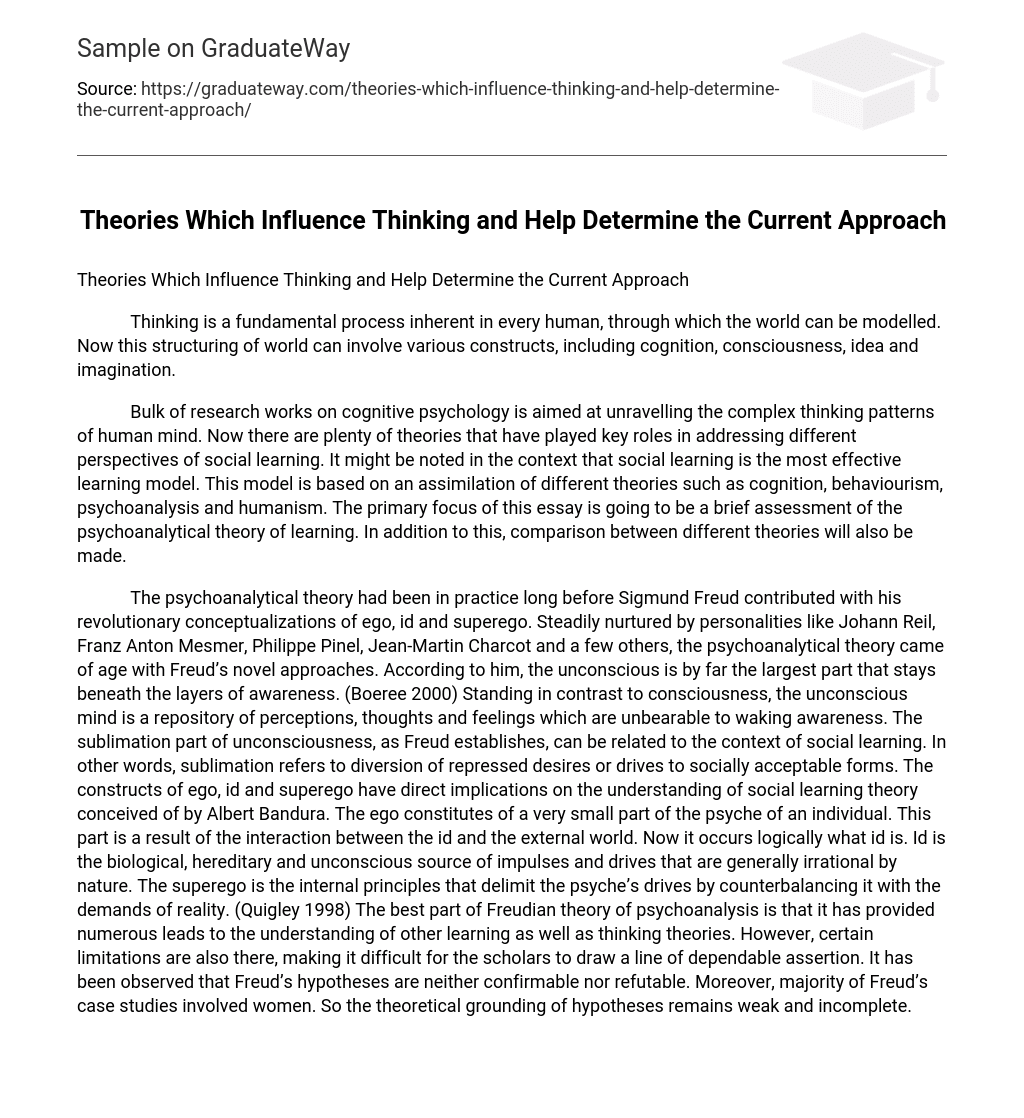Thinking is a fundamental process inherent in every human, through which the world can be modelled. Now this structuring of world can involve various constructs, including cognition, consciousness, idea and imagination.
Bulk of research works on cognitive psychology is aimed at unravelling the complex thinking patterns of human mind. Now there are plenty of theories that have played key roles in addressing different perspectives of social learning. It might be noted in the context that social learning is the most effective learning model. This model is based on an assimilation of different theories such as cognition, behaviourism, psychoanalysis and humanism. The primary focus of this essay is going to be a brief assessment of the psychoanalytical theory of learning. In addition to this, comparison between different theories will also be made.
The psychoanalytical theory had been in practice long before Sigmund Freud contributed with his revolutionary conceptualizations of ego, id and superego. Steadily nurtured by personalities like Johann Reil, Franz Anton Mesmer, Philippe Pinel, Jean-Martin Charcot and a few others, the psychoanalytical theory came of age with Freud’s novel approaches. According to him, the unconscious is by far the largest part that stays beneath the layers of awareness. (Boeree 2000) Standing in contrast to consciousness, the unconscious mind is a repository of perceptions, thoughts and feelings which are unbearable to waking awareness. The sublimation part of unconsciousness, as Freud establishes, can be related to the context of social learning. In other words, sublimation refers to diversion of repressed desires or drives to socially acceptable forms. The constructs of ego, id and superego have direct implications on the understanding of social learning theory conceived of by Albert Bandura. The ego constitutes of a very small part of the psyche of an individual. This part is a result of the interaction between the id and the external world. Now it occurs logically what id is. Id is the biological, hereditary and unconscious source of impulses and drives that are generally irrational by nature. The superego is the internal principles that delimit the psyche’s drives by counterbalancing it with the demands of reality. (Quigley 1998) The best part of Freudian theory of psychoanalysis is that it has provided numerous leads to the understanding of other learning as well as thinking theories. However, certain limitations are also there, making it difficult for the scholars to draw a line of dependable assertion. It has been observed that Freud’s hypotheses are neither confirmable nor refutable. Moreover, majority of Freud’s case studies involved women. So the theoretical grounding of hypotheses remains weak and incomplete.
When it comes to other theories and their interrelation with Freudian concepts, it is fascinating to identify the key connections. Motivation, one of the effective modelling parameters in Bandura’s social learning theory and also in Vygotsky’s social development theory, is directly linked with Freud’s assumption of id. Humanism and behaviourism too have incorporated the ideal of motivation as a primary component of id. John Bowlby and Mary Ainsworth, the chief contributors in the development of attachment theory of interpersonal relationships, have also taken into account the Freudian concept of Motivation. Abraham Maslow in his theorization on Hierarchy of Needs has given emphasis on motivating factors in meeting needs. (Norwood 2008) However, the behaviourist theory of learning compiled by Skinner focuses more on external experiences for resulting reinforcers than on motivational factors.
List of References
Boeree, Dr. C. George (2000) Freud and Psychoanalysis [online] available from <http://webspace.ship.edu/cgboer/psychoanalysis.html> [9 March 2009]
Quigley, T. R. (1998) A Brief Outline of Psychoanalysis [online] available from <http://www.panix.com/~squigle/at/psycho.html> [9 March 2009]
Norwood, George. (2008) Maslow’s Hierarchy of Needs [online] available from <http://www.deepermind.com/20maslow.htm> [9 March 2009]





